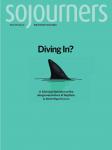WITH THE GLOBAL refugee crisis worsening every day, thank goodness we’ve put the Christmas season behind us, what with its pesky reminders about welcoming the stranger, finding room for weary travelers, and great things coming from little poor kids.
It got pretty uncomfortable there for a while.
To compensate, some of us even started altering our long-held perceptions with a critical eye, like maybe Joseph and Mary should have called ahead to reserve a room, or used Uber instead of that donkey, or at the very least packed better for the baby. Swaddling clothes just don’t cut it as a lining for your standard manger, and straw is no substitute for a quilted blanket. I know for a fact that straw pokes uncomfortably through most fabrics, something I learned as a young boy who thought he could jump into some hay bales after being told not to, and then stood in front of his parents, covered in straw, and denied it. (On laundry day, mom cleared out the lint trap with a pitchfork.)
As a nation, it seems we lost some of our yuletide spirit this past season, and I’m not just referring to the palpable lack of gratitude expressed by family members when unwrapping the gifts I had lovingly purchased at the Dollar Store. With almost 4 million refugees fleeing Syria, many of our political leaders responded in ways that seemed inappropriate. Maybe not as inappropriate as giving frankincense and myrrh to a poor newborn (a month’s diaper service might have been the better choice), but surprisingly uncompassionate. The U.S. agreed to take only 10,000 of the refugees, less than 1 percent of the growing total, but even that was 100 percent too many for most Republican governors.
To be fair, their reluctance does comport with the nation’s long-standing decree: “Give me your tired, your poor, your huddled masses, after a two-year wait, a background check, a blood test, and a cavity search, yearning to be free of these several questionnaires which we’ll process right after lunch.” (It wouldn’t all fit on the front of the Statue of Liberty, so it continues on the back. A lot of people miss that.)
Some religious leaders were acting more like King Herod when it came to welcoming the strangers. Jerry Falwell Jr., the president of Liberty University, might have been less than helpful when he said, “I’ve always thought that if more good people had concealed-carry permits, then we could end those Muslims before they walked in.” Not exactly a Hallmark-card moment, but one probably missed by Muslim refugees who were, at that moment, trying to survive stormy seas in their escape to Greece. Even if they make it to the U.S., it’s unlikely they would move to Falwell’s home base of Lynchburg, Va., a town whose name suggests a certain lack of cordiality.
When he spoke forcefully as a Christian promoting the right to bear arms, Falwell did not specify the biblical principal he was basing it on (although I’m pretty sure Jesus was an excellent marksman, probably spending his weekends clearing out the groundhogs in the garden of Gethsemane), but the Liberty head is in favor of his students carrying firearms to class.
Falwell didn’t clarify if he wished his students to also be armed at athletic events with rival teams, although one assumes the tailgating revelry beforehand would only be enhanced by the presence of firearms. Nothing pumps up team spirit like firing handguns into the air over a parking lot.
REFUGEES TO OUR country have always experienced resistance, but they have persevered and brought new energy to our economy and our culture. There is a learning curve, to be sure, such as the idiosyncrasies of the English language that require an exclamation point after “Jeb Bush!” or that the Bible Belt is not something you wear but a place you should never drive through. And they should be taught not to watch television networks named after animals, which they’d mistakenly think are about the natural world.
It’s true that newcomers might not be welcomed by the likes of Ted Cruz or Donald Trump—to save time, we just call them “The Crumps”—but most of America is happy to have the refugees here. Refugees are part of the human story, and we embrace them as our new neighbors and friends.
Because somebody’s got to eat at Chipotle.

Got something to say about what you're reading? We value your feedback!

